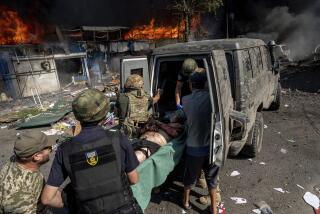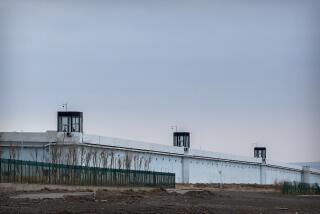Bosnia Muslims Face Extinction, U.N. Study Says
- Share via
UNITED NATIONS — In a report etched with dispiriting details of cruel atrocities, Tadeusz Mazowiecki, an official human rights investigator, warned the United Nations on Wednesday that the Muslims of Bosnia-Herzegovina are “virtually threatened with extermination” unless outsiders act to save them before winter sets in.
Mazowiecki, former prime minister of Poland, reported to the Human Rights Commission in Geneva, concluding that “widespread and serious human rights violations” not only continue in Bosnia but have even worsened.
He offered a scathing condemnation of “ethnic cleansing”--the attempt, chiefly by Serbs, to clear Croats and Slavic Muslims out of Serb-held areas by military force.
“Ethnic cleansing does not appear to be the consequence of the war but rather its goal,” he said. “This goal, to a large extent, has already been achieved through killings, beatings, rape, destruction of houses and threats.”
The U.N. official, who has just completed his second tour of Bosnia and other areas of the former Yugoslavia, said that, as a result of the intensification of ethnic cleansing, “there is less and less resistance on the part of the non-Serbian population, increasing numbers of whom are ready to abandon everything and to flee their homeland.”
His report also included the results of an investigation by Dr. Clyde Snow, an American forensic expert, into chilling evidence of a massacre of wounded Croatian prisoners by the Serb-dominated Yugoslav national army in 1991.
U.N. peacekeepers led Snow to the site of what seemed to be a mass grave in the Vukovar area of Croatia. The skeletal remains there, Snow said, could have come from some of the 175 young, wounded Croatian prisoners who were beaten severely by Yugoslav soldiers, then herded away in trucks. Under a Red Cross agreement, the soldiers were supposed to be transferred from a Vukovar hospital in Serbian territory to safety in Croat-controlled territory.
Civilian police from the U.N. peacekeeping force in eastern Croatia say they have strong evidence of at least four mass graves in the area around Vukovar but have refrained from ordering exhumations because their mandate does not allow such involvement.
Sgt. Larry Moore of the Royal Canadian Mounted Police said he and other U.N. police have surveyed all four suspected sites in eastern Croatia, where hundreds remain missing and unaccounted for after last year’s siege by Serbian guerrillas and soldiers of the Yugoslav People’s Army.
“They are all from the September to November time frame,” Moore said of the graves, referring to the fierce three-month siege of Vukovar last fall, which accounted for at least one-quarter of the 10,000 killed during the war in Croatia.
Moore, head of the eight-man Mounties contingent in the Sector East area that includes Vukovar, said the United Nations has “pretty solid information” on four sites, the largest of which is at Tordinci, about 10 miles west of Vukovar. Numerous consistent reports by witnesses now living in Croat-held territory suggest that about 200 bodies are buried at Tordinci, Moore said, adding that the area of turned earth corresponds with the survivors’ reports.
Another 70 bodies are believed buried at a site U.N. police have surveyed near the town of Lovas, about 15 miles southeast of Vukovar. In the town of Dalj, just north of Vukovar, U.N. troops have been provided with a list of 25 names of massacre victims said to be buried together there; police have similar evidence of a fourth mass grave containing at least 13 corpses.
Meantime, Mazowiecki also reported that conditions in some refugee centers are so terrible that, “according to the medical experts, a public health disaster that will dwarf the number of victims of mass executions and of the military conflict is already under way.”
He found dangerous warning signs of early “ethnic cleansing” in Kosovo, the Albanian-populated enclave within Serbia.
Appointed by the United Nations to investigate the atrocities as a possible prelude to war crimes trials in the distant future, Mazowiecki bemoaned the failure of other European countries to offer haven to more than a few of the victims. He called for emergency action. He also proposed that outside powers, presumably through the United Nations, create and guard security zones inside Bosnia with enough food and medical supplies to care for Bosnians driven from their homes.
His report amounted to a catalogue of Bosnian terror. Among the incidents and problems cited:
* To avoid expulsion from their homes, inhabitants of the Muslim village of Mahovliani surrendered their weapons to Serbian officials and agreed to serve in the Serbian militia if needed. Despite this, they have been under constant attack by unidentified assailants.
* The city of Travnik, with a normal population of 19,000, has been forced to care for 14,000 Muslim refugees. Many refugees told Mazowiecki that they had each paid 150 German marks (almost $100) to an “emigration agency” in their home area for the right to leave. Buses then drove them to combat zones, which they had to cross to reach Muslim-controlled Travnik. “En route,” he said, “they were repeatedly beaten, robbed, subjected to various forms of harassment and in some cases raped or shot.”
* Mazowiecki found 3,000 people crammed into a few buildings, waiting, hoping to flee “ethnic cleansing.” “They live in unspeakable squalor,” he said, “sleeping on thin blankets and lice-infested straw, drinking contaminated water and surviving on minimum rations of bread.” His report noted that “similarly appalling conditions are believed to be found also in a number of other smaller centers throughout Bosnia and Herzegovina.”
Times staff writer Carol J. Williams in Vienna contributed to this report.
More to Read
Sign up for Essential California
The most important California stories and recommendations in your inbox every morning.
You may occasionally receive promotional content from the Los Angeles Times.










